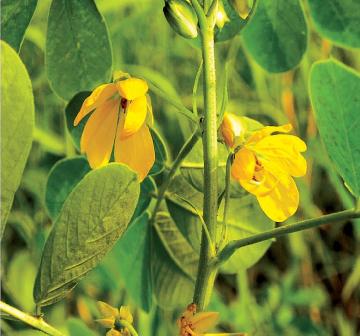
Cassia spp.
Cassia tora is a common herbaceous annual occurring as a weed throughout India and belongs to the family of leguminosae. It is a small attractive shrub grows during the monsoon period. It contains pod. Cassia tolerates a wide range of climates and temperatures, though it tends towards loving warmth. Their showy flowers make them desirable ornamental plants for parks and gardens. Arid land species are well-suited for reforestation purposes and to provide sources of natural goods and improving soil quality and stemming desertification also.
Nutritive value
Studies have shown that methanolic extracts of Cassia tora improved microbiological safety by detoxifying aflatoxin B1. The seeds of Cassia tora have been shown to contain high amounts of protein and essential amino acids. Currently Cassia tora seeds are being used as a source of galactomannan gums in the food industry. In India, Cassia tora is the common species which is not very much relished in the green stage. However after conservation in the form of hay and silage, it is consumed by the ruminants. Its seeds are used as a concentrate, although they are rich in tannins.
Deleterious factors
Because of the presence of various antinutritional factors like trypsin inhibitors, polyphenols, saponins and haemagglutinins, their utilization as a protein source particularly in animal feed, has not been explored so far. Various detoxification procedures attempted such as autoclaving, acid treatment, alcohol extraction showed limited success in removing these factors.
